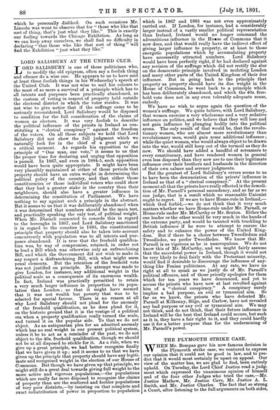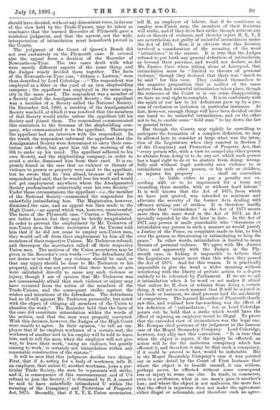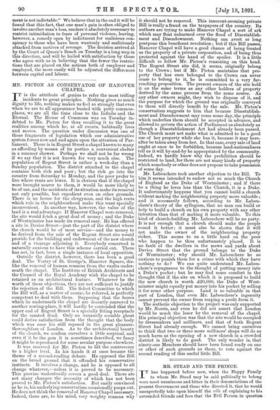THE PLYMOUTH STRIKE CASE.
WHEN Mr. Bompas gave his now famous decision in the Plymouth strike case, we ventured to express our opinion that it could not be good in law, and to pre- dict that it would most certainly be upset on appeal. Our view of the matter has, we are glad to find, been entirely upheld. On Tuesday, the Lord. Chief Justice read a judg- ment which expressed the unanimous opinion of himself and of the four other Judges who tried the case,—Mr. Justice Mathew, Mr. Justice Cave, Mr. Justice A. L. Smith, and Mr. Justice Charles. The fact that so strong a Court, after listening to the full arguments on both sides, should have decided, without any dissentient voice, in favour of the view held by the Trade-Unions, may be taken as conclusive that the learned Recorder of Plymouth gave a mistaken judgment, and that the narrow, not the wide, interpretation of intimidation must henceforth prevail in the Courts.
The judgment of the Court of Queen's Bench did not rest exclusively on the Plymouth case. It covered also the appeal from a decision of the Recorder of Newcastle-on-Tyne. The two cases dealt with what were merely different aspects of the same thing, and the Judges wisely decided them together. The facts of the Newcastle-on-Tyne case, " Gibson v. Lawson," were thus described by Lord Coleridge :—" The respondent was employed as a fitter in the yard of an iron shipbuilding company ; the appellant was employed in the same capa- city in the same yard. The respondent was a member of a Society called the Amalgamated Society ; the appellant was a member of a Society called the National Society. On December 3rd, 1890, a, meeting of the Amalgamated Society was held, at which it was resolved that the members of that Society would strike unless the appellant left his Society and joined them. The respondent communicated this resolution to the foreman of the shipbuilding com- pany, who communicated it to the appellant. Thereupon the appellant had an interview with the respondent. In the result, the respondent informed the appellant that the Amalgamated Society were determined to carry their reso- lution into effect, but gave him till the morning of the 6th to make up his mind. The appellant adhered to his own Society, and the shipbuilding company, in order to avoid a strike, dismissed him from their yard. It is ex- pressly found in the case that no violence or threats of violence to person or property were used to the appellant, but he swore that he was afraid, because of what the respondent had said, that he would lose his work and would not get employment anywhere where the Amalgamated Society predominated numerically over his own Society.'" Under these circumstances, the appellant—i.e., the member of the National Society—summoned the respondent for unlawfully intimidating him. The Magistrates, however, dismissed the case, and an appeal was then made to the High Court,—an appeal which was, however, unsuccessful. The facts of the Plymouth case, " Curran v. Trealeaven," are better known, but they may be briefly recapitulated. In order to prevent the employment by Mr. Treleaven of non-Union men, the three secretaries of the Unions told him that if he did not cease to employ non-Union men, they would call off from their employment by him all the members of their respective Unions. Mr. Treleaven refused, and thereupon the secretaries called off their respective Union men. The motives of the Union secretaries may be given in the Recorder's own words :—" The defendants did not desire or intend that any violence should be used, or that any injury should be done to Mr. Treleaven or his property, and it was not proved that their words or acts were calculated directly to cause any such violence or injury, though I am of opinion that Mr. Treleaven was not unreasonably afraid that such violence or injury may have occurred from the action of the members of the Trade-Unions, and the consequent strike, against the wishes and intentions of the defendants. The defendants had no ill-will against Mr. Treleaven personally, but acted with the object of obliging all members of the Union to abandon the work." The Recorder held that the facts of the case did constitute intimidation within the words of the section, and that the men were properly convicted. With this decision, however, the Judges of the High Court were unable to agree. In their opinion, " to tell an em- ployer that if he employs workmen of a certain sort, the workmen of another sort in his employ will be told to leave him, and to tell the men, when the employer will not give way, to leave their work, using no violence, but quietly ceasing to work,' is certainly not intimidation within any reasonable construction of the statute."
It will be seen that this judgment decides two things. First, that if A, acting for a body of workmen, tells B, an employer, that unless C, another workman, joins a par- ticular Trade Society, the men he represents will strike, and if, in consequence of this announcement and of C's refusal to join the Society, C is dismissed by B, A cannot be said to have unlawfully intimidated. C within the meaning of the Conspiracy and Protection of Property Act, 1875. Secondly, that if X, Y, Z, Union secretaries, tell B, an employer of labour, that if he continues to employ non-Union men, the members of their Societies will strike, and if they do in fact strike, though without any acts or threats of violence, and thereby injure B, X, Y, Z are nevertheless not guilty of unlawful intimidation under the Act of 1875. Now, it is obvious that this decision involved a consideration of the meaning of the word " intimidates" in the statute. It is true that the Judges refused to put forth any general definition of intimidation as beyond their province, and would not declare, as did Mr. Justice Cave when sitting alone at Liverpool, that intimidation must be " limited to threats of personal violence," though they declared that there was " much to be said " for this view. They confined themselves to the negative proposition that in neither of the cases before them had unlawful intimidation taken place, though the reticence of the Court is in one sense disappointing, we have no real right to complain. It is in conformity with the spirit of our law to let definitions grow up by a pro- cess of exclusion or inclusion in particular instances. At last, however, enough things will have been decided on the one hand to be unlawful intimidation, and on the other not to be, to enable some " bold man " to lay down the law in general terms. But though the Courts may rightly be unwilling to anticipate the formation of a complete definition, we may be allowed here to consider at large what was the inten- tion of the Legislature when they enacted in Section 7 of the Conspiracy and Protection of Property Act, that " every person who, with a view to compel any other person to abstain from doing or to do any act which such person has a legal right to do or to abstain from doing, wrong- fully and without legal authority uses violence to or intimidates such other person, or his wife or children, or injures his property shall on conviction be liable either to pay a penalty not ex- ceeding £20, or to be imprisoned for a term not exceeding three months, with or without hard labour." It is well known that the Act of 1875, from which we have just quoted, was intended to minimise and alleviate the severity of the former Acts dealing with offences arising out of strikes. It is therefore hardly arguable that " intimidates " in the Act of 1875 means more than the same word in the Act of 1871, an Act specially repealed by the Act later in date. In the Act of 1871, any person is made punishable who " threatens or intimidates any person in such a manner as would justify a Justice of the Peace, on complaint made to him, to bind over the person so threatening or intimidating to keep the peace." In other words, intimidation is limited to mean threats of personal violence. We agree with Mr. Justice Cave, and apparently with the Judges in the Ply- mouth case, in finding it impossible to believe that the Legislature meant more than this when they passed the Act of 1875. And for this reason. It is practically impossible to give the word a wider meaning without interfering with the liberty of private action to a degree unlikely to be tolerated by Parliament. If we are to call it intimidation when A by word or act makes B afraid that unless he, B, does or refrains from doing a certain thing, A will act in such manner that B will be injured in his trade or business, we shall prevent half the machinery of competition. The learned Recorder of Plymouth clearly saw this, and realised how far-reaching was the effect of his definition of " intimidation ; " for, as Lord Coleridge points out, he held that a strike which would have the effect of injuring an employer would be illegal. To prove that the extended view of intimidation was the legal one, Mr. Bompas cited portions of the judgment in the famous case of the Mogul Steamship Company. Lord Coleridge, however, very ably met this contention. " It is true that when the object is injury, if the injury be effected, an action will lie for the malicious conspiracy which has effected it, and therefore it may be that such a conspiracy, if it could be proved in fact, would be indictable. But in the Mogul Steamship Company's case it was pointed out in some detail by the Court of First Instance that where the object is to benefit oneself, it can seldom, perhaps never, be effected without some consequent loss or injury to some one else. In trade, in commerce, even in a profession, what is one man's gain is another's loss; and where the object is not malicious, the mere fact that the effect is injurious does not make the agreement either illegal or actionable, and therefore such an agree- went is not indictable." We believe that in the end it will be found that this fact, that one man's gain is often obliged to involve another man's loss, renders it absolutely necessary to restrict intimidation to fears of personal violence, leaving, however, a remedy open by indictment for malicious-con- spiracy to those who have been wantonly and maliciously attacked from motives of revenge. The decision arrived at by the Court of Queen's Bench on Tuesday is a long step in this direction, and will be hailed with satisfaction by those who agree with us in believing that the fewer the restric- tions that are placed on the actions both of employer and employed, the more easily will be adjusted the differences between capital and labour.




















































 Previous page
Previous page